- Home
- Michael Duffy
Drive By
Drive By Read online
The Tower by Michael Duffy
‘A gripping, fast-paced debut that introduces Michael Duffy’s simple, true and confident voice to an army of crime lovers. Sure to be a hit with fans of Underbelly and Michael Connelly. The Tower unites classic noir suspense with seat of the pants action set against the glimmer and grime of the harbour city, where the sharks are beginning to circle.’
SydneyUnleashed.com
ALSO BY MICHAEL DUFFY
Fiction
The Simple Death
The Tower
True Crime
Bad
Call Me Cruel
DRIVE BY
MICHAEL DUFFY
Author’s note
This is a work of fiction. Like most works of fiction it is inspired by real life. However, each character has been created by the author, and any resemblance to a living person is coincidental, and readers must not assume any part of the story has a factual basis. There is no Toyota workshop in Auburn. The NSW government recently modified the right to silence.
First published in 2013
Copyright © Michael Duffy 2013
All rights reserved. No part of this book may be reproduced or transmitted in any form or by any means, electronic or mechanical, including photocopying, recording or by any information storage and retrieval system, without prior permission in writing from the publisher. The Australian Copyright Act 1968 (the Act) allows a maximum of one chapter or 10 per cent of this book, whichever is the greater, to be photocopied by any educational institution for its educational purposes provided that the educational institution (or body that administers it) has given a remuneration notice to Copyright Agency Limited (CAL) under the Act.
Allen & Unwin
83 Alexander Street
Crows Nest NSW 2065
Australia
Phone: (61 2) 8425 0100
Email: [email protected]
Web: www.allenandunwin.com
Cataloguing-in-Publication details are available
from the National Library of Australia
www.trove.nla.gov.au
ISBN 978 1 74331 263 6
eISBN 978 174 343 0484
Set in 12/16 pt Bembo by Post Pre-press Group, Australia
For Sandy, who chose death
. . . the knowledge of the circumstances of which we must make use never exists in concentrated or integrated form but solely as the dispersed bits of incomplete and frequently contradictory knowledge which all the separate individuals possess.
F.A. Hayek
Mate, say what you like about Imad, it’s a fact he brought peace to Roselands, something the media is too stupid to understand. Before he got things organised, boys was being killed all over the place, that little girl they all went on about too. But Imad was doing the drive-through at Macca’s one day and it just came to him: why not do the same thing with the product? The man is born entrepreneurial. So he got our street set up, made the customers come in cars, drive one-way, boys on the corners tooled up so there was respect, and the thing ran like an oiled machine I tell you, oiled. Come in, give your money to one boy, drive down, pick up the buy at the other end, people’s backyards being used to get the product into the area, get it out quick if the jacks came by. Everyone in Macadamia Street was looked after, all our neighbours, I never heard one word of complaint. Basically all these people are our friends. Even Mrs Billecki, the old bitch, never made no trouble after Imad had a word to her son and helped him with that council stuff.
And no one got hurt. That’s what the fuckwits in the media ignored. Before Imad got things organised people had been dropping like flies everywhere, Punchbowl, Roselands, Narwee. You name it, name any place and I’ll tell you some boy got kneecapped or drive-byed. That sort of shit had been going on forever, for almost a year, but Imad stopped it because he was strong and smart. Everyone started coming to us, like three hundred buys a day, because it was all well organised and protected, everyone was feared from him. That’s why the people started calling him the King of Roselands.
I tell you, it was the saddest day when the jacks framed Imad for arranging them two knocks. May the eyes of the cowards never sleep. They couldn’t get him for the drive-through set-up because everyone loved it, no one would ever give no evidence. So they got him on some bullshit charges about wanting to warn off that Parramatta crew had been coming onto our territory ’cause they had this thing with the Deebs. Like he would have had to kill them, like there wouldn’t have been something else.
Farid took over after they arrested Imad and I tell you, mate, he’s just as good an organiser, maybe even better. Imad had a lot of that thing, you know, charisma and he was good-looking too, the handsomest of us brothers after Rafiq. Plus he was a crazy guy sometimes. Like when them Cronulla riots happened and those skips was running around with T-shirts saying WE GREW HERE YOU FLEW HERE, Imad was one of the men who organised the convoy from Punchbowl and gave out the baseball bats and stuff. But he used the ice sometimes and he could get too physical. Farid is different. Totally devoted to the family, just like Imad, but a real thinker. Like Mama always says to us four brothers, All you boys is different and you’re all beautiful in your own ways.
Some boys were thinking Farid was soft when he took over after Imad went to the supermax, shut down the drive-through market and all, but Farid soon showed them who was the boss. Like the time this runner named Zorigo was selling stuff for some other gang but lying about it. One day Farid cannot get hold of him and when Zorigo turns up at night he says he forgot Farid’s mobile number. So Farid takes him down to the tattoo parlour in Canterbury and gets his number tattooed on Zorigo’s arm. He is never forgetting it again but Farid is changing his phone the next week anyway. Like, what a joke.
Farid had to do more serious things until those boys would take him seriously. There was that Brendan Jones who ripped off one of our crew. You know when you go to the barber in Lakemba everyone just puts their guns on the counter it is no hassle, but this Jones thinks he can just steal one of the guns, he is a stupid junkie. Farid had him dealt with and a few other dissers. After that he was respected all around the city.
I have nothing to do with any of this stuff though for this reason: after Farid started working with Imad when he was eighteen, the papa said we had to draw a line in the sand and us younger two—that’s me Jabber and Rafiq, my baby brother who I love so much—would have to study and get legitimate jobs, for the family’s sake. We’re a lot younger than the others; Jamila and Shada were born in between Farid and me, and also Jamila married this solicitor, Salim Soufi, a few years ago. The papa was pretty impressed by Salim, a Muslim of the people becoming a lawyer, and I could see him thinking about us two young boys, thinking about what we could become too. Like, the normal opportunities for the people in Australia hadn’t been there for Imad and Farid, back in the day, but now they were there for us. So one day he just come out and told us: After Farid we is going to draw a line in the sand. He had these barbecue tongs when he told us this and drew a line through the air with them.
I was kind of happy, tell the truth, to be on Rafiq’s side and not the other side of this line. I really like cars—I work at Auburn Toyota—and I just want to keep my head down, under a bonnet all day. They’re fine machines I am privileged to work with and basically I just want to get better at what I do. All that stuff Imad and Farid do, I can’t see how they work it all out; I guess you need to do what comes naturally. But me, just helping out the parents when they need me and other family stuff and learning about engines, that’s enough complication for me.
And then this shit about Rafiq come along.
Contents
PART 1 THE TRIAL
DAY ONE
DAY THREE
DAY FIVE
; PART 2 FOG
DAY SIX
DAY SEVEN
DAY EIGHT
DAY NINE
DAY TEN
DAY ELEVEN
DAY TWELVE
DAY FOURTEEN
PART 3 GOING UNDERGROUND
PART 4 WARS END
ABOUT THE AUTHOR
part 1
the trial
It was a five-storey block, security good except the front door was propped open with a brick, the small lobby awash with advertising brochures, envelopes and free newspapers. Bec Ralston and Tony Morrow attending from Liverpool detectives, following up an assault at the Railway Hotel. It was Morrow’s op, Bec dragged along at the last minute.
‘If anything goes off, give me room,’ said Tony, stretching his arms as they began to climb the stairs. The smell of body odour fought oxygen for space in the narrow stairwell. Gary Stern, possible witness, lived on the fourth floor. ‘We get there, stand on opposite sides of the door. Got it? You hearing?’
‘I’ll be in contraposition to you.’
‘What?’
‘Opposite.’
‘That’s good. Speak English at all times.’
Tony went up and Bec followed, her feet feeling the concrete beneath the thin carpet, no underlay. The developer must have saved a hundred bucks by that, at least. Tony was still gabbling. ‘Remember the first rule: Anything can happen.’
Bec knew the second rule too: What does happen is nearly always predictable. Boring, even.
On the third floor Tony stopped, pulled his weapon from its shoulder holster and examined it. Looking for blemishes. ‘Checked yours?’
‘In the car.’
Tony had insisted on driving; they hadn’t worked together before but he had a reputation. He’d told her he was thirty, two years older than her. She couldn’t recollect why this had come up; by that point she hadn’t been paying much attention.
He reholstered his weapon. ‘Just give me room if anything happens, that’s the main thing.’ He was puffing in an aggrieved sort of way, as though wishing Gary Stern lived on the third floor.
‘Okay.’
Bec had a black belt in taekwondo, but Tony was a big bloke, more impressive to your average hoon. A bigger target, too.
At the door he wiped his hands on his trousers one last time, gestured to Bec to stand out of the line of fire, and pounded. All done with a certain amount of exaggeration, meant to reassure one of them.
‘Police Mr Stern, can we have a word?’
There was the sound of sudden movement inside, followed by silence and then a baby started crying. As Tony went to pound again, the door opened.
The citizen was big with a shaved skull, black Adidas trackies with the white stripes down the side, nothing else. Lots of tatts, mainly spider webs but also a rat on his arm and a big dragon around the neck, a designer ecosystem. Stubble, bad teeth, earrings. Seemed calm. Bec tried to get a good look at his pupils, but there wasn’t enough light. Conversation ensued and the detectives moved inside with the citizen’s permission, no sign of anyone else except the baby’s nagging wail in some other room.
‘Just sit down anywhere,’ he said, pointing to a low sofa; he seemingly liked the idea they might sit while he stood. The detectives stayed on their feet and he looked around the room, nervous now.
‘I need to get Bethane.’
‘Yeah mate,’ Tony said. ‘Just a few questions and we’ll leave you to it. Did you see—’
‘She’s in distress, can’t you fucking hear?’
‘Three quick questions then we’ll be out of your hair.’
‘She left her in my care.’
‘Just two—’
‘It’s a responsibility I take fucking seriously.’
‘Get the baby, Mr Stern,’ Bec said, but he didn’t seem to hear her.
He stepped towards Tony, started yelling about his rights, then headed off down a short hall towards the crying. Maybe they should have left then but they didn’t, they had work to do. A caseload.
The crying stopped abruptly but the citizen didn’t come back for a few minutes. Tony stood in the middle of the warm room swearing every now and then while Bec prowled, found bills, magazines, a DVD collection like every other one. The place smelled of fried food overlaid with air freshener, a woman’s touch.
‘I don’t like this,’ Tony said, and the citizen reappeared, smiling for the first time.
‘You were saying?’
‘How’s Bethane?’
‘Good, good, just likes to be patted, you know.’
‘Sounds like you’ve got the knack.’
The citizen was tapping his left hand on his thigh at high speed, small movements but lots of them. Tony opened his jacket so he could see the gun. ‘Can we see the little one?’
‘I—no, mate, might wake her up. Just let her sleep, eh.’
Bec hadn’t picked it, no children herself. Tony would be a family man, he had the ring on his left hand.
‘Let’s go.’
He shepherded the citizen down the short hall, Bec following.
It was fast and unexpected, as usual in a Rule One situation. The citizen darted ahead, by the time they got to the room he was out on a small balcony, holding a bundle over the drop, the baby. There didn’t seem to have been enough time, but there it was. The baby was silent and still, maybe something wrong about the angle of the head to the shoulders. Tony was blocking most of her view as he pulled out his gun.
He took a step forward and Bec grabbed the back of his jacket, called out, ‘We’re going, Mr Stern, we’re leaving.’
Tony came gently, suddenly in shock. It was what Bec would recall later, the speed with which things had happened. On the balcony the citizen was yelling again, a litany of indignation and self-pity. A gabble, hard to make out. It was probably meth but there hadn’t been signs, and it was only 11.30 am.
That’s the thing about surprises, they surprise you.
She got Tony out the door and into the hall, turned her head for one last look. The citizen was standing in the same position but his hands were empty, looking around as though he’d lost something.
From outside the building, sounds.
The debriefing took hours. The child’s neck had almost certainly been broken in its cot, the rest of the event theatre. The mother said her boyfriend had a history of mental illness, the cops should have known.
Late that night the crime manager, Leanne Walton, got them into her office, offered them seats and asked how they were. OH&S. She was a middle-aged blonde, had a plastic tray marked in with a stack of paper big enough to break your heart. Tony was still standing, he took out his badge and gun, laid them on the desk.
‘That’s me done,’ he said, and walked out.
Bec half stood, then noticed Walton’s stillness and sat down. Always she preferred action but older people weren’t like that, not the smart ones.
‘Never the same since he had the daughter,’ Walton said. ‘Two boys, no worries, but the girl . . .’
‘What a waste. All his time in.’
Walton shook her head. ‘Know thyself. Ancient Greeks. What about you?’
‘I’m still here.’
‘You want counselling?’
‘No.’
‘Means you need it.’
She picked up a pen and ticked a box on the form in front of her.
Bec said, ‘Tony, seen it before?’
‘I’ve seen everything, Becster. Even seen a kid go off a balcony.’ She had children herself, there were photos on her desk to prove it. From somewhere she summoned a smile. ‘But first time’s special, isn’t it?’
On TV they would have bonded now, gone out and drunk red wine. Instead, Walton lifted a sheet of paper from the pile, said, ‘Russell Knight?’
‘Antipathetic.’
‘Not a psych test, Bec. You know him?’
‘OIC Beldin, the Jason Teller murder.’
‘The one you got kicked off?’
‘Li
ke I said—’
‘Wants you at the trial Monday, boss has said yes.’
‘Why?’
‘Don’t know. Ten, King Street in the big city. You can find it?’
‘Fuck.’
‘Mine exactly, we are so far behind.’ The inspector blinked. ‘Done a Supreme Court before?’
‘Never.’
‘Just like the District but with resources. Give anything pressing to Reynolds.’ She dropped the sheet of paper in the bin beside her chair, picked up the next one from the pile. ‘You still here?’
DAY ONE
The courts at the top of King Street are over a century old, heritage. In Court Two Bec sat on a hard wooden bench behind the bar table, watching Russell Knight talk to the prosecutor and wondering when he would tell her why she was there. She’d arrived ten minutes ago and so far they had not spoken. He was a big man, muscle going to fat, gone, a slab face given character by a strangely small mouth. Sometimes he would purse his lips and then stop, as though aware the effect was feminine. Bec had seen witnesses scared by the expression, colleagues confused.
The officer in charge of an investigation always attended the trial, to give evidence and help the lawyers with information and witness wrangling. He might be assisted by another officer, when protected witnesses had to be looked after or the families of the victim and the accused kept apart, but this was rare. Bec looked around to see if there was anything she should be doing. She could feel the work piling up already back at Liverpool. Reynolds on being informed of her caseload had not been terribly interested.
Almost a year ago Jason Teller had been found in Gallipoli Park in the south-west with four bullets in him. He had a reputation: standover man, one of the city’s bigger drug dealers. He had not been greatly mourned, and there were no members of his family in the public gallery now, just a few elderly citizens, court watchers, and a dozen members of the Habib family chatting with animation.

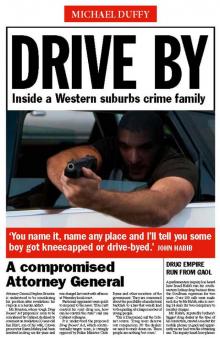 Drive By
Drive By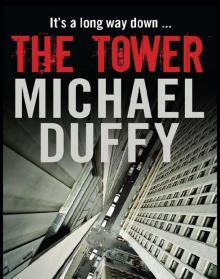 The Tower
The Tower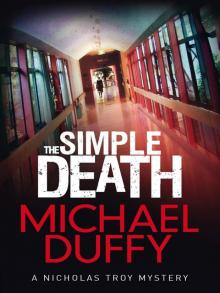 The Simple Death
The Simple Death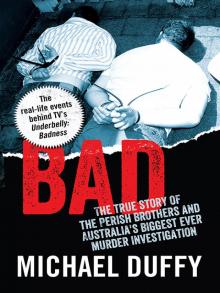 Bad
Bad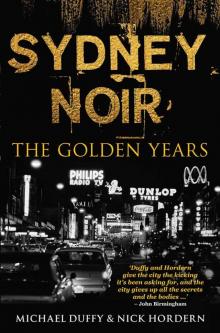 Sydney Noir
Sydney Noir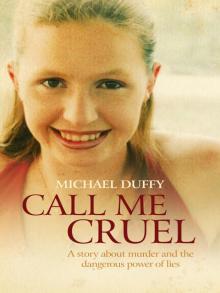 Call Me Cruel
Call Me Cruel